Libya–Malta relations
Libyan-Maltese relations are foreign relations between Libya and Malta. Both countries established diplomatic relations soon after Malta's independence. Both countries had very close ties and cooperation during Dom Mintoff's governments. Libya has an embassy in Attard and Malta has an embassy in Tripoli. In 2013, Libyan Prime Minister Ali Zeidan, said that the relationship between the two countries is "excellent".[1]
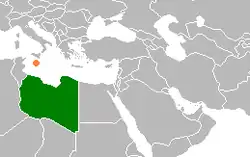 | |
Libya |
Malta |
|---|---|

History
Early relations (1964-1980)
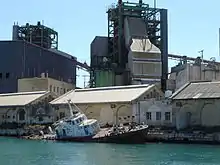
During the Mintoff years following the independence of Malta, Libya had loaned several million dollars to Malta to make up for the loss of rental income which followed the closure of British military bases in Malta;[2] These closer ties with Libya meant a dramatic new (but short-lived) development in Maltese foreign policy: Western media reported that Malta appeared to be turning its back on NATO, the UK, and Europe generally.[3] By at least the 1970s Libya already had a permanent embassy in Malta located at the prominent Villa Drago, in Sliema.[4] The villa is also known as Dar Tarak or Dar Tarek, and is now a Grade 1 scheduled building.[5][6][7]
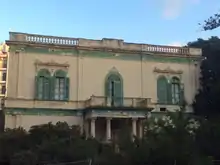
History books were published that began to spread the idea of a disconnection between the Italian and Catholic populations, and instead tried to promote the theory of closer cultural and ethnic ties with North Africa. This new development was noted by Boissevain in 1991:
...the Labour government broke off relations with NATO and sought links with the Arab world. After 900 years of being linked to Europe, Malta began to look southward. Muslims, still remembered in folklore for savage pirate attacks, were redefined as blood brothers.[8]
Gaddafi even claimed that the Maltese people were of Arab origin, through Phoenician descent.[9]
Between 1975 and 1976, the Libyan government gave Malta's 1st (Maritime) Battery of the Malta Land Force (now the Maritime Squadron of the AFM) four patrol boats.[10]
The Saipem incident (1980)
In 1980 an oil rig of the Italian company Saipem commissioned by Texaco to drill on behalf of the Maltese government 68 nautical miles south-east of Malta had to stop operations after being threatened by a Libyan gunboat. Both Malta and Libya claimed economic rights to the area and this incident raised tensions. The matter was referred to the International Court of Justice in 1982 but the court's ruling in 1985 dealt only with the delineation of a small part of the contested territory.[11][12]
Improving relations (1982-1987)
Malta and Libya had entered into a Friendship and Cooperation Treaty, in response to repeated overtures by Gaddafi for a closer, more formal union between the two countries; and, for a brief period, Arabic had become a compulsory subject in Maltese secondary schools.[13][14] In 1984 the Mariam Al-Batool Mosque was officially opened by Muammar Gaddafi in Malta, two years after its completion.
Nationalist governments to Libyan Civil War (1987-2011)
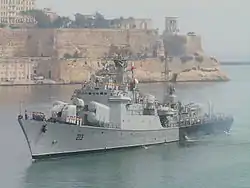
Following the termination of the Mintoff and Mifsud-Bonnici governments, Malta retained its excellent relations with Libya. Relations cooled in 2005 following the assassination in Malta of Fathi Shaqaqi, presumably by the Mossad, but relations were later normalised.
.jpg.webp)
On 21 February 2011, in the beginning of the first Libyan Civil War, two Libyan Air Force fighter jets defected to Malta instead of bombing protesters in Benghazi. The Maltese government's refusal to extradite the pilots or return the aircraft to Libya swiftly established the island state as an unfriendly neighbour of the Gaddafi government amidst the Libyan uprising.[15] Malta also coordinated the evacuation of tens of thousands of foreign workers who got caught up in the conflict; and played a lesser role in the later international intervention in the conflict.
On 11 March, one of Gaddafi's cousins attempted to bribe Maltese Air Force officials in order to purchase jet fuel.[16]
Post-Gaddafi era (2011-present)
Following the overthrow of Libya's Muammar Gaddafi, relations have continued to strengthen from both parts. The Maltese Government in collaboration with MCAST has offered scholarships to Libyan students. Discussions on Illegal Migrations also have been undergoing. In September 2013, a deal was struck for Malta to procure crude oil, refined oil, jet fuel and LPG at a fixed price. Some issue on and oil exploration area, claimed by both countries, have been discussed by both parties, agreeing for joint oil exploration by both countries. Malta will also help Libya in transport and civil aviation. The Libyan government was keen on improving links between the two countries including oil and gas, education, including a rehabilitation of the Ta' Giorni Institute, and other aspects.[1]
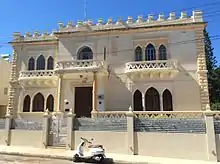
During the second Libyan civil war, Malta (along with most of the international community) continued to recognize the Government of National Accord after it was declared unconstitutional by the Supreme Court of Libya. Libyan chargé d'affaires Hussin Musrati insisted that by doing so, Malta was "interfering in Libyan affairs".[17] Due to the conflict, there are currently two Libyan embassies in Malta. The recognized General National Congress now controls the official Libyan Embassy in Balzan, while the unrecognized House of Representatives has opened a consulate in Ta' Xbiex. Each of the two embassies say that visas issued by the other entity are not valid.[18]
On 27 January 2015, Islamic State militants attacked the Maltese-run Corinthia Hotel in Tripoli. Following further expansion of the Islamic State in Libya (particularly the fall of Nawfaliya), Prime Minister Joseph Muscat and Leader of the Opposition Simon Busuttil called for the United Nations and European Union to intervene in Libya to prevent the country from becoming a failed state.[19][20]
A meeting between the leaders of the two rival governments of Libya was held at Auberge de Castille in Valletta, Malta on 16 December 2015. The meeting was delayed for a few days after the representatives from the Tobruk government initially failed to show up.[21][22]
References
- "Malta strikes favourable oil, gas procurement deal with Libya". Times of Malta. 2 September 2013. Retrieved 2 September 2013.
- "Gaddafi to the Rescue", in Time Magazine (Monday, Jan. 17, 1972). Last viewed August 8, 2007.
- "Our Sad Adieu", in Time Magazine (Monday, Apr. 09, 1979). Last viewed August 8, 2007.
- Chambry, D.; Trump, David H. (1978). Malta. Nagel Publishers. pp. 108, 189. ISBN 9782826307112.
- "Archived copy". Archived from the original on 2017-04-11. Retrieved 2017-04-11.CS1 maint: archived copy as title (link)
- "Archived copy". Archived from the original on 2017-04-11. Retrieved 2017-04-11.CS1 maint: archived copy as title (link)
- "Archived copy" (PDF). Archived from the original (PDF) on 2018-01-17. Retrieved 2018-01-16.CS1 maint: archived copy as title (link)
- Jeremy Boissevain, "Ritual, Play, and Identity: Changing Patterns of Celebration in Maltese Villages," in Journal of Mediterranean Studies, Vol.1 (1), 1991:87-100 at 88.
- "Gaddafi qal hekk fuq Malta". Is-Sejħa Tal-Ħbiberija (in Maltese). Vol. 1 no. 4. October 1980.
- "Maritime Squadron Armed Forces of Malta". Steno.webs.com. March 2010. Archived from the original on 7 April 2014. Retrieved 15 February 2015.
- "MaltaToday". archive.maltatoday.com.mt. Retrieved 16 January 2018.
- "Cour internationale de Justice - International Court of Justice". Icj-cij.org. Archived from the original on 2 March 2016. Retrieved 16 January 2018.
- Boissevain, Jeremy (1984). "Ritual Escalation in Malta". In Eric R. Wolf (ed.). Religion, Power and Protest in Local Communities: The Northern Shore of the Mediterranean. Religion and Society. Walter de Gruyter. p. 166. ISBN 9783110097771. ISSN 1437-5370.
- Hanspeter Mattes, "Aspekte der libyschen Außeninvestitionspolitik 1972-1985 (Fallbeispiel Malta)," Mitteilungen des Deutschen Orient-Instituts, No. 26 (Hamburg: 1985), at 88-126; 142-161.
- Peregin, Christian (22 February 2011). "Two Libyan fighter pilots defect to Malta". Times of Malta. Retrieved 15 February 2015.
- Caruana, Claire (25 June 2016). "Gaddafi relatives offered Malta Armed Forces bribes – Clinton ally". Times of Malta. Archived from the original on 25 June 2016.
- "Malta interfering in Libya's affairs - charge d'affaires". Times of Malta. 20 December 2014. Retrieved 20 December 2014.
- "Libyan Embassy says visas issued by any other entity 'not valid'". Times of Malta. 8 January 2015. Retrieved 15 February 2015.
- "Malta should press EU to intervene in Libya - Simon Busuttil". Times of Malta. 15 February 2015. Retrieved 15 February 2015.
- Micallef, Keith (15 February 2015). "Prime Minister calls for UN intervention in Libya". Times of Malta. Retrieved 15 February 2015.
- Grech, Herman (12 December 2015). "Top level Libya rivals meeting in Malta cancelled at last minute". Times of Malta. Retrieved 12 December 2015.
- "Heads of rival Libyan parliaments meet in Malta, seek more time for unity government". Times of Malta. 15 December 2015. Retrieved 16 December 2015.
